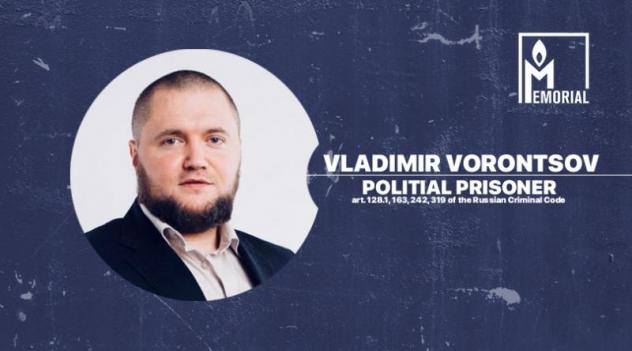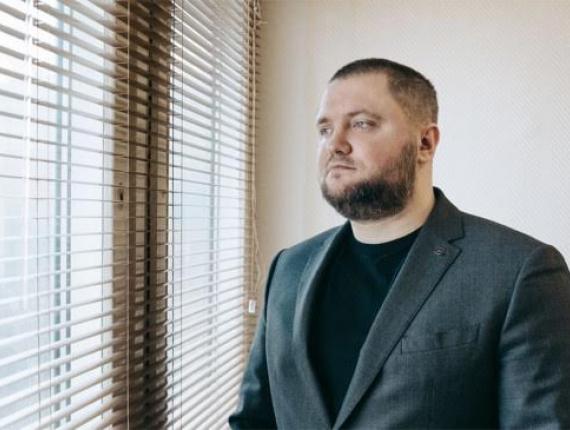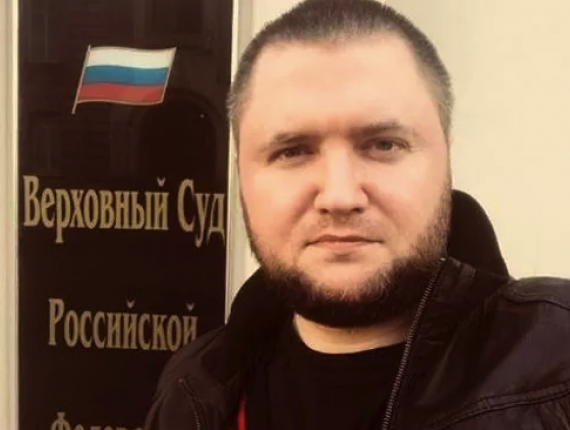Memorial: ‘Police Ombudsman’ Vladimir Vorontsov is a political prisoner
We believe he is being prosecuted on account of his civic and human rights activities
Memorial Human Rights Centre, in accordance with international criteria, considers Vladimir Vorontsov a political prisoner. We believe his imprisonment is politically motivated and is intended to strengthen the power of those in authority and to stop his civic activities.
We demand that Vladimir Vorontsov be released immediately from custody and be given a fair trial.
- Who is Vladimir Vorontsov and why is he being prosecuted?
Vladimir Vorontsov is a 38-year-old Muscovite who worked in the police force for 13 years. Even before he left the police service, he created two communities on the VK.com social network: ‘Police Ombudsman’ and ‘Police Dating’, dedicated primarily to protecting the rights of law enforcement officers. Both communities became very popular and not only among police officers: the number of subscribers reached nearly half a million and Vorontsov himself earned the nickname ‘Police Ombudsman.’
Vorontsov was an active critic of the leadership of Russia’s Ministry of Internal Affairs. He published internal documents of the Ministry, condemned police misconduct, defended illegally dismissed officers and organized charitable fundraising for the medical treatment of Ministry employees and their children. Vorontsov supported Aleksei Navalny's movement and publicised the investigations of the latter’s Anti-Corruption Foundation (an organization designated as extremist and banned in Russia). Vorontsov also worked as a court reporter for the registered publication Rosderzhava.
Beginning in April 2020, criminal investigations were opened against Vorontsov on a wide range of charges, accompanied by an active campaign to discredit him in state-controlled media. TV broadcasts and newspaper publications accused Vorontsov of sexual harassment, fraud and of having links with radical nationalists. On 7 May a specialised police unit stormed Vorontsov's apartment through a window, searched the premises, and then detained him.
After Vorontsov was remanded in custody, many police officers from across the country began posting photographs in his support. Personal guarantees for the ‘Police Ombudsman’ were signed by human rights activists, journalists, politicians and public figures. On 8 May 2020, members of the police unit tasked with taking Vorontsov to court refused to do so, stating their full support for the activities of the ‘Police Ombudsman.’ There is a ‘Free Vladimir Vorontsov’ channel (@freeombudsment) on Telegram.
- The charges brought against Vorontsov:
1. Extortion of a police officer on a large scale under the threat of publishing their intimate photographs, committed in 2017 (Article 163, Part 2, Paragraph d, of the Russian Criminal Code). According to the investigation, the officer refused to pay and Vorontsov allegedly published an intimate photograph of the officer, which was classed as distribution of pornography by a group of persons with the use of communication networks (Article 242, Part 3, Paragraphs ‘a’, ‘b’, of the Russian Criminal Code);
2. Publicly insulting on the Internet an FSB investigative officer who participated in the search of Vorontsov's home (Art. 319 of the Russian Criminal Code);
3. Publication of intimate photographs of a female police officer (Article 242, Part 3, Paragraph b, of the Russian Criminal Code);
4. Extortion of money from a female police officer who had been dismissed, under threat of publication of their intimate photographs (Article 163, Part 1, of the Russian Criminal Code);
5. Publication of six texts insulting the head of the Legal Department of the Moscow branch of the Ministry of Internal Affairs responsible for the capital’s Central Administrative District (Article 319 of the Russian Criminal Code);
6. Publication of false information about the actions of a lawyer who acted in the case of a police officer (Article 128.1, Part 1 of the Russian Criminal Code).
- Why Memorial considers Vladimir Vorontsov a political prisoner
The case against Vorontsov developed rapidly and was accompanied by a powerful media campaign. Investigative agencies publicly sought out persons who were victims of Vorontsov's actions. However, they were able to press charges only in relation to a few minor incidents for which the evidence was in any case weak. For some of the cases, the statute of limitations had expired. Police officers who provided information to Vorontsov and supported him were subjected to pressure, threats and dismissal.
The course of Vorontsov’s prosecution clearly shows a common practice of Russian law enforcement agencies in first arresting a person and bringing charges against them that are often minor and questionable in nature (and often soon abandoned), while trying to ‘dig up’ as much as possible about the individual and creating a negative public image about them.
The charges relating to more serious offences, for which pre-trial detention is possible, bear the greatest signs of fabrication, while other charges (slander and insulting a public official) do not involve custody. The term for which he has been remanded in custody (22 months by April 2022) clearly does not correspond to the public danger of the acts with which Vorontsov has been charged and his criminal prosecution has a clearly selective nature.
The disloyalty of law enforcement officers and protection of their rights from the arbitrariness of their superiors is traditionally perceived by the authorities as a threat to their own unrestricted use of law enforcement officers to maintain the existing regime.
You can read a detailed analysis of each of the charges and the full text of our reasoning for declaring Vorontsov a political prisoner on our website.
Recognition of an individual as a political prisoner does not imply Memorial Human Rights Centre agrees with or approves of their views, statements, or actions.
- How to help
You can support all political prisoners by donating to the Fund to Support Political Prisoners of the Union of Solidarity with Political Prisoners via PayPal, using the e-wallet at helppoliticalprisoners@gmail.com.
Поделиться:
- ВКонтакте
- РћРТвЂВВВВВВВВнокласснРСвЂВВВВВВВВРєРСвЂВВВВВВВВ
- Telegram



